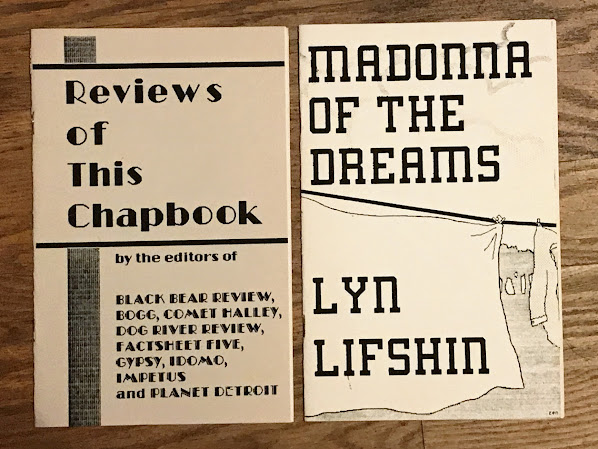BE: When and why did you start Mockersatz? What was your day job at the time?
zS: I got started in the early ‘80s as a poet submitting really bad poems around and getting no replies or empty rejections from many of the poetry magazines from the Writer’s Market book borrowed from the library, but really nice and helpful rejections from small press editors and thought “these are my people.” So after a few acceptance poems and some urging from others I started my own litzine. Though I felt like I wasn’t quite qualified, I remember Ron Androla saying “Nobody is. We just do it.”
It’s funny, one of the pressing reasons I got an office job was to have access to a Xerox machine. Todd Moore chidingly called us the ‘Mimeo Mafia,’ but a majority of the publishers I ran with used copiers, referred to with the eponym Xerox. I had done statistical typing so I worked as a teletype operator for a financial institution and they had nice, fat, feature-rich Xeroxes that could even do 11x17 and the employer didn’t mind me staying late to ‘get caught up.’ Of course I was pushing poetry and blazing through their toner, but bringing my own paper because I preferred not to use plain white.
BE: How did you land on the name, Mockersatz? Was it tongue-in-cheek? Did you feel you published good work?
zS: Mockersatz is a combination of ‘mock’ and ‘ersatz’ and my thinking was maybe two ‘fakes’ will make it ‘real.’ That seemed to encapsulate my mixed feelings of jumping into publishing with no parachute or experience and maybe having and making fun of the whole poetry thing while still taking it seriously if that makes sense. I really felt it needed some lightening up. It was the era of raw-feeling, gritty poetry with a touch of over-seriousness, over-stating it’s worth. So I guess it was a little tongue-in-cheek, but also I felt I had something to contribute to the overall movement. My first issue of Mockersatz even included an insert that was a mock version of itself, called “Mockersatz Fake” poking fun at the poets, the art, and all its seriousness.
I’ve always been most creative around an existing structure rather than creating from thin air. I’m just going to leave that sentence here.
I felt I did publish pretty good works by both poets I knew and those I didn’t. I published some marginal works too that I either didn’t understand or wanted to get a ‘name’ poet in an issue. There was a lot of energy and the feeling was we were subverting the system of larger publishing houses because we could say ‘fuck it,’ when we wanted and just send out a broadsheet to our subscribers and reviewers and just each other. It was a great mail community and we felt giddy at times, overworked at times and defeated sometimes.
I got a lot more submissions than I thought possible and because I had been treated so lovingly as a fledgling poet by other small press people, tried to reply to each and every one – especially with rejection. I wrote back with what I liked; what I didn’t like; and how I thought their writing could be improved, along with the caveat that I was describing what worked and didn’t for Mockersatz, not whether it was good or bad poetry. I felt pretty comfortable in that role, but was frequently overwhelmed with working, living out in the sticks as a former suburb rat. The first couple of issues were typed and then I began ‘composing’ on a Mac, printing in horrible dot-matrix.
After not too many issues, I found I would really enjoy a set of submissions or a poem in another small press mag and would approach the poet with an idea for a chapbook. Chapbooks were all the rage. We were vomiting chapbooks. I had an electric saddle stapler that my mom had given me – we were both graphic artists – and this made the folded half-size 8 ½ x 11 chapbook size a good format. I even did an issue of Mockersatz in that size. But anyway, chapbooks intrigued me because a single author/poet’s work never seemed like enough in a magazine format, even if there were a couple poems. We had to think of size too – we were generally mailing small press mags in a manila folder and chapbooks could be mailed book rate with an address cover and either stapled or taped shut. It also seemed more immediate that way. It gave the poet a real chance to have their breathing room, and it gave the editors a chance to give their expression in the choice, order, style and artwork (if any) to bring it all home. See my previous sentence about where I’m most creative.
As a ‘publisher’ Mockersatz Zrox did chapbooks of favorites like Todd Moore, Ron Androla, Don Wentworth, Lyn Lifshin. Lyn was a special case. She wrote so abundantly, and submitted everywhere and you always got an envelope ghastly stuffed and folded with her poems that had obviously seen many submissions and probably many rejections. She was in her ‘Madonna’ phase. I accepted one poem of hers called “Madonna of the Dreams” and made an entire chapbook with that title repeated 20 times and that was it. But it was all with love and intensity that small press had at the time.
BE: What were some of your favorite small mags around that time and who were some of your favorite small press poets that maybe young poets of today should read and why?
zS: I cannot overstate the impact Ron Androla had on me. While embracing the aforementioned gritty and brutally honest ideas of a poet stuck in suburbia and low wage factory work, his word choice and rhythm usually delighted the thinking and musical side of my brain. His Northern Pleasure press put out small but outstanding mag and chapbooks.
 |
| Ron Androla and Bart Solarczyk |
Don Wentworth, whose poems are minimalist stories of synchronicity I still enjoy. Others, like Todd Moore, Sheila E Murphy, Tony Moffeit, Stacey Sollfrey and Patrick McKinnon all of whom I did chapbooks of. I miss that I never got to do a chap of Bart Solarczyk, but he’s still out there doing his wonderment.
Other small press poets/ mags I enjoyed greatly were: John Elsberg’s Bogg, Dan Raphael’s NRG, Steve Doering’s Random Weirdness, Kurt Nimmo’s Planet Detroit, Michael Hathaway’s Kindred Spirit, David Griesman’s Abby - the list is long and the production values were highly variable – which made it all a beautiful chaos.
I also loved the tapemags: Chuck Connor’s Skate Tape/IDOMO, Lloyd Dunn’s Phonostatic and your own Sanctuary had outstanding compilations.
BE: What were some of your greatest accomplishments with Mockersatz? How long did it last? Did it help propel you into other collaborations or adventures?
zS: I started off with the idea that I wanted something different, distinct and fun. Mockersatz’s first issue was a ‘press run’ of 250, each with the unique cover of a tire inked and rolled on it. I remember the covers spilled out into the front yard separated to dry. In each issue I put the poems and artwork in the magazine with the attribution to the poet at the end with a bio. I wanted the flow of the magazine to be it’s own thing without skimming for a favorite poet. I’m not sure that went over well with a few poets – we were all used to seeing our name below our poems. I did issues where all the poems on the right side page were readable, but you had to turn the issue upside-down to read the other half. I drew crazy line drawings, included people’s collage poems and wrote rambling rants about all kinds of shit.
I enjoyed reviewing magazines, chapbooks and cassettes and put out quite a few issues of MockreviewZ and reviews in chapbook size like “Small Pet Repair” and “Accupinchure.” I enjoyed getting review copies and tried to give each their due, strength and falterings.
In the spirit of Mock and Ersatz, I created “Reviews of this Chapbook,” a chapbook of reviews of itself as would appear in other magazines, by real reviewers like Factsheet Five, Planet Detroit, Gypsy and Dog River Review among others. A fun excursion into recursion.
For me it lasted about 4-5 years which also got me started in doing local readings, mail-art and a wider variety of ‘poetic actions.’ It was crazy and crazy good times. We drank, tripped, read poetry and mostly helped each other with love and energy. I wouldn’t take a second of it back.
BE: Any advice (or musings) for POD mag publisher/sellers of today?
zS: Not really. I’m not one to give advice because when you’re young and impassioned, you probably need to find your own electrical socket to stick a tongue into. We made the most of the technology we had and that’s what I see others doing today, careening in virtual reality driverless cars across artisanal interstates of new networks. Nowadays, I still read poetry in virtual open mics, do graffiti, repurpose goodwill electronic toys to spout haiku, photography and dabble in synth-noise fests. It feels like an extension of those wonderfully explosive days of small press.
Zen Sutherland skips thru life like a smooth flat river rock tossed over a calm lake. Late in life he discovered his greatest love, Helen, who feeds, loves and supports his mad scientist soul. He lives in Asheville, NC painting, writing, photographing, doing graffiti and other renegade art projects along with taking electronic toys he finds at thrift stores and makes them do things other than originally intended. He and Helen hope to live to 85 whereupon they’ll take Dr. Kevorkian’s formula and make room for the next generations.





